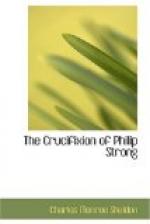It came as he kneeled down; and it did not seem to him at all strange or absurd that as he kneeled, there came to his thought a picture of the Brother Man. And he could almost hear the Brother Man say: “Your work is in Milton, in Calvary Church yet. Except a man shall renounce all that he hath he cannot be His disciple.” It mattered not to Philip that the answer to his prayer came in this particular way. He was not superstitious or morbid, or given to yielding to impulse or fancy. He lay down upon the couch again and knew in his heart that he was at peace with God and his own conscience in deciding to stay with Calvary Church and refuse the call to Fairview.
CHAPTER XVIII.
When, a few minutes later, Mrs. Strong came up, Philip told her exactly how he had decided.
“I cannot leave these poor fellows in the tenements yet; my work is just beginning to count with them. And the church, oh, Sarah, I love it, for it has such possibilities and it must yield in time; and then the whiskey men—I cannot bear to have them think me beaten, driven out, defeated. And in addition to all the rest, I have a feeling that God has a wonderful blessing in store for me and the church very soon; and I cannot banish the feeling that if I should accept the call to Fairview, I should always be haunted by that ghost of Duty murdered and run away from which would make me unhappy in all my future work. Dear little woman,” Philip went on, as he drew his wife’s head down and kissed her tenderly, while tears of disappointment fell from her—“little woman, you know you are the dearest of all earthly beings to me. And my soul tells me the reason you loved me enough to share earth’s troubles with me was that you knew I could not be a coward in the face of my duty, my conscience, and my God. Is it not so?”
The answer came in a sob of mingled anguish and happiness:
“Yes, Philip, but it was only for your sake I wanted you to leave this work. It is killing you. Yet,”—and she lifted her head with a smile through all the tears—“yet, Philip, ’whither thou goest I will go, and where thou lodgest I will lodge; thy people shall be my people, and thy God my God. Where thou diest will I die, and there will I be buried; the Lord do so to me and more also if aught but death part thee and me.’”




